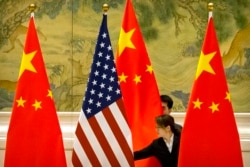China’s central bank has partnered with SWIFT, the European-based global system for financial messaging and cross-border payments, to set up a joint venture — a move that observers say shows China’s ambitions to take the digital version of its currency, the yuan, global.
Some analysts VOA spoke to add that the development may further trigger a “hot” war between the official digital currency, often called the renminbi, and the U.S. dollar, although many agree that China’s currency still has a long way to go before it would rival its U.S. counterpart.
The new entity, Finance Gateway Information Services Co., was established in Beijing in mid-January with registered capital of $12 million, and its business scope includes information system integration, data processing and tech consultancy, according to China’s National Enterprise Credit Information Public System.
SWIFT, the Society for Worldwide Interbank Financial Telecommunication, owns a 55% stake in the venture, while the remaining 45% is co-owned by four institutions under China’s central bank, including the China National Clearing Center, Cross-Border Interbank Payment System (CIPS) and its digital currency research institute.
Geopolitical implications
Abishur Prakash of the Center for Innovating the Future in Toronto, Canada, said the partnership highlights two geopolitical implications.
“The first aspect to this is China laying down the foundation for its digital yuan to go global. And the second implication of this has to do with … obviously, USD is the main focus. But it’s also about the U.S. losing control of systems it created,” Prakash told VOA earlier this week.
“In the middle of massive geo-political competition between the U.S. and China, China is plugging into SWIFT more deeply. It is quite a powerful message that the control the U.S. once had in these systems is no longer the same,” he added.
Founded in 1973, the Belgium-based SWIFT is dominated by the U.S. dollar. And its platforms, which connect 11,000 financial institutions worldwide, enable the U.S. to enforce sanctions in the service of its foreign policy.
The analyst said China likely will next make use of tech services and online platforms, owned by Chinese companies, to expand global uses of its digital yuan.
For example, he said 550 million global users of China’s ride-hailing giant Didi Chuxing, which is testing the digital yuan on its platforms, may soon opt to pay for yuan-denominated taxifares — transactions that will be settled at the touch of a finger with SWIFT’s help.
'Hot war'
Once China’s digital yuan takes off globally, its rivalry with the U.S. dollar is expected to intensify.
“I view this as the hot war. Technology is literally causing the U.S. and China to clash. The old American system versus what China is envisioning. And unless it is treated as such, then the gravity of what’s taking place will be missed … There’s only going to be more competition, more clashing, and in many ways, more splitting between the U.S. and China,” Prakash said.
Geopolitical implications aside, the new venture will be mutually beneficiary to both China and SWIFT, said Jerry Lin, director of the Financial Research Institute at the Taiwan Academy of Banking and Finance in Taipei.
Lin said that China needs SWIFT to roll out its digital yuan globally while SWIFT is eyeing business opportunities from the digital currency’s cross-border transactions.
It also will equip SWIFT with experience to prepare necessary infrastructure for the future settlement of digital currencies as, among 17 central banks in the world that are planning digital currencies, China is the frontrunner in planning cross-border uses of its digital yuan, he said, citing statistics from Bank for International Settlements.
Low trust in digital currencies
Lin, however, warned that the trust level in digital currencies among consumers remains lower.
“The private sector still has a low level of trust in e-wallets, even if they’re to be issued by central banks because consumers are highly concerned about the protection of their privacy. This will pose a great challenge to the world’s central banks, including China’s. Consumers need to be convinced that their privacy will be rightly secured before they will accept digital currencies,” Lin told VOA.
China may gear up to take its digital yuan global, but physical renminbi isn’t upstaging the U.S. greenback any time soon, both Prakash and Lin agreed.
Taking SWIFT as an example, Lin said that 43% of global transactions on its platforms are denominated in dollars, compared to the Chinese yuan’s less than 2%. That’s not to mention that the renminbi is neither a global reserve currency nor a frequently traded money in capital markets.
Risk aversion
The venture, in addition, is part of China’s plans to build a proprietary payments system for cross-border transaction, averting risk from potential sanctions to be imposed by the U.S. that will be enforced through SWIFT platforms, said Song Hong at the Institute of World Economics and Politics under the Chinese Academy of Social Sciences in Beijing.
“That will allow us to bypass SWIFT [platforms] and to resort to other channels or currencies other than renminbi to settle international trade. We won’t necessarily have to use [SWIFT’s] platforms to complete global trade,” Song told VOA.












